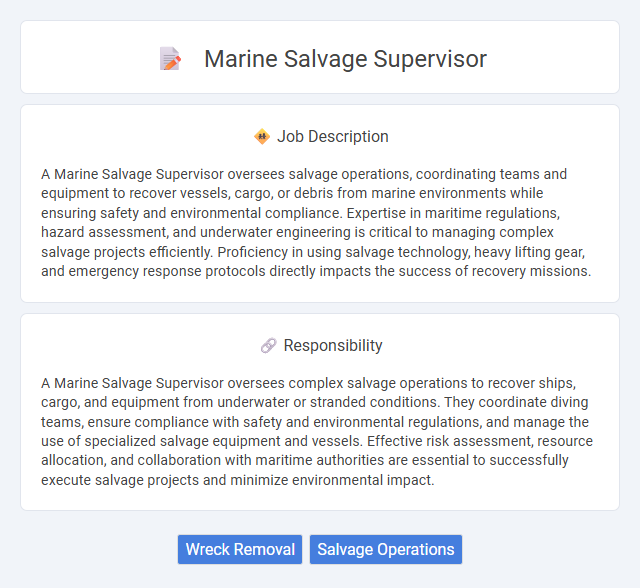
A Marine Salvage Supervisor oversees salvage operations, coordinating teams and equipment to recover vessels, cargo, or debris from marine environments while ensuring safety and environmental compliance. Expertise in maritime regulations, hazard assessment, and underwater engineering is critical to managing complex salvage projects efficiently. Proficiency in using salvage technology, heavy lifting gear, and emergency response protocols directly impacts the success of recovery missions.
Candidates with strong problem-solving skills and the ability to remain calm under pressure are likely suitable for a Marine Salvage Supervisor role. Physical fitness and experience with maritime operations increase the probability of success in handling challenging underwater recoveries and managing emergency situations. Individuals lacking resilience or team leadership experience may struggle to meet the demanding conditions of the job.
Qualification
A Marine Salvage Supervisor must possess extensive experience in underwater operations, hazard assessment, and project management within maritime environments. Essential qualifications include certification in diving and salvage techniques, knowledge of marine safety regulations such as IMO and OSHA standards, and proficiency in coordinating multi-disciplinary teams during complex salvage missions. Strong technical expertise in underwater welding, rigging, and environmental impact mitigation is critical for ensuring successful and safe recovery operations.
Responsibility
A Marine Salvage Supervisor oversees complex salvage operations to recover ships, cargo, and equipment from underwater or stranded conditions. They coordinate diving teams, ensure compliance with safety and environmental regulations, and manage the use of specialized salvage equipment and vessels. Effective risk assessment, resource allocation, and collaboration with maritime authorities are essential to successfully execute salvage projects and minimize environmental impact.
Benefit
Marine Salvage Supervisor roles likely offer competitive salaries reflecting the specialized skills required in underwater recovery and emergency response operations. Potential benefits may include comprehensive health insurance, paid leave, and opportunities for professional development in maritime safety and environmental protection. The position might also provide unique experiences and job satisfaction from contributing to critical maritime incident resolutions and asset recoveries.
Challenge
The role of a Marine Salvage Supervisor likely involves managing complex and unpredictable underwater recovery operations, requiring quick decision-making under pressure. Challenges probably include coordinating diverse teams in hazardous environments while ensuring safety and efficiency. The supervisor may frequently face technical difficulties and environmental factors that demand innovative problem-solving skills.
Career Advancement
Marine Salvage Supervisors oversee complex underwater recovery operations, coordinating divers and equipment to ensure efficient and safe project completion. Gaining certifications in commercial diving, project management, and marine engineering significantly enhances career prospects and eligibility for senior roles. Experience in high-profile salvage projects and advanced credentialing often leads to leadership positions within specialized maritime firms or consultancy opportunities.
Key Terms
Wreck Removal
A Marine Salvage Supervisor specializing in wreck removal coordinates complex operations to safely extract sunken vessels and debris from marine environments, ensuring navigational safety and environmental protection. Expertise in underwater cutting, lifting techniques, and hazardous material handling is critical to efficiently managing salvage crews and heavy equipment. Successful wreck removal projects require compliance with maritime regulations and collaboration with environmental agencies to mitigate ecological impact.
Salvage Operations
Marine Salvage Supervisors coordinate complex salvage operations involving the recovery of sunken vessels, cargo, and hazardous materials to ensure environmental safety and asset protection. They oversee diving teams, manage salvage equipment, and implement risk assessments to optimize operational efficiency and compliance with maritime laws. Expertise in marine engineering, oceanography, and project management is essential for successful execution of salvage missions.
 kuljobs.com
kuljobs.com